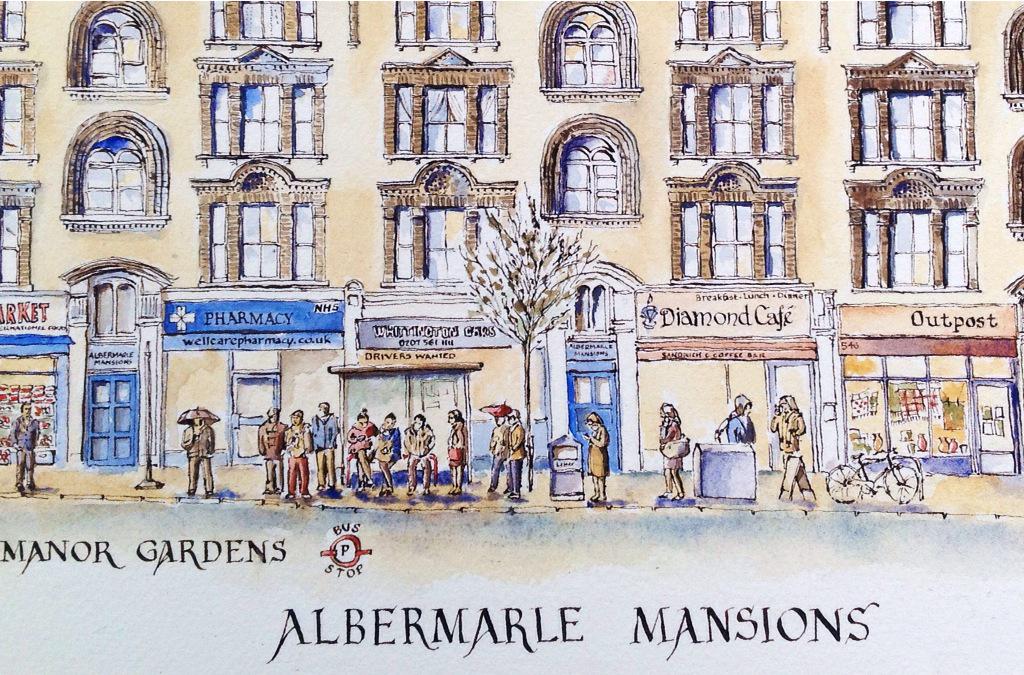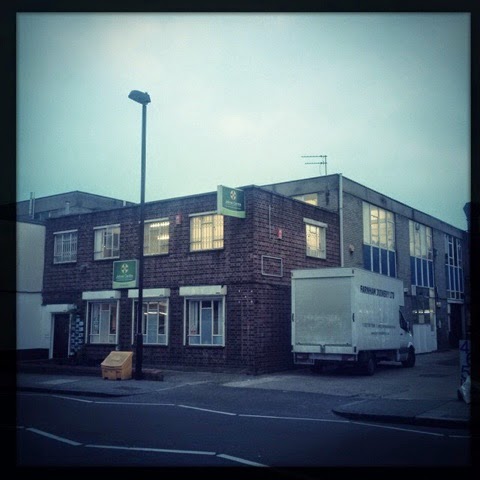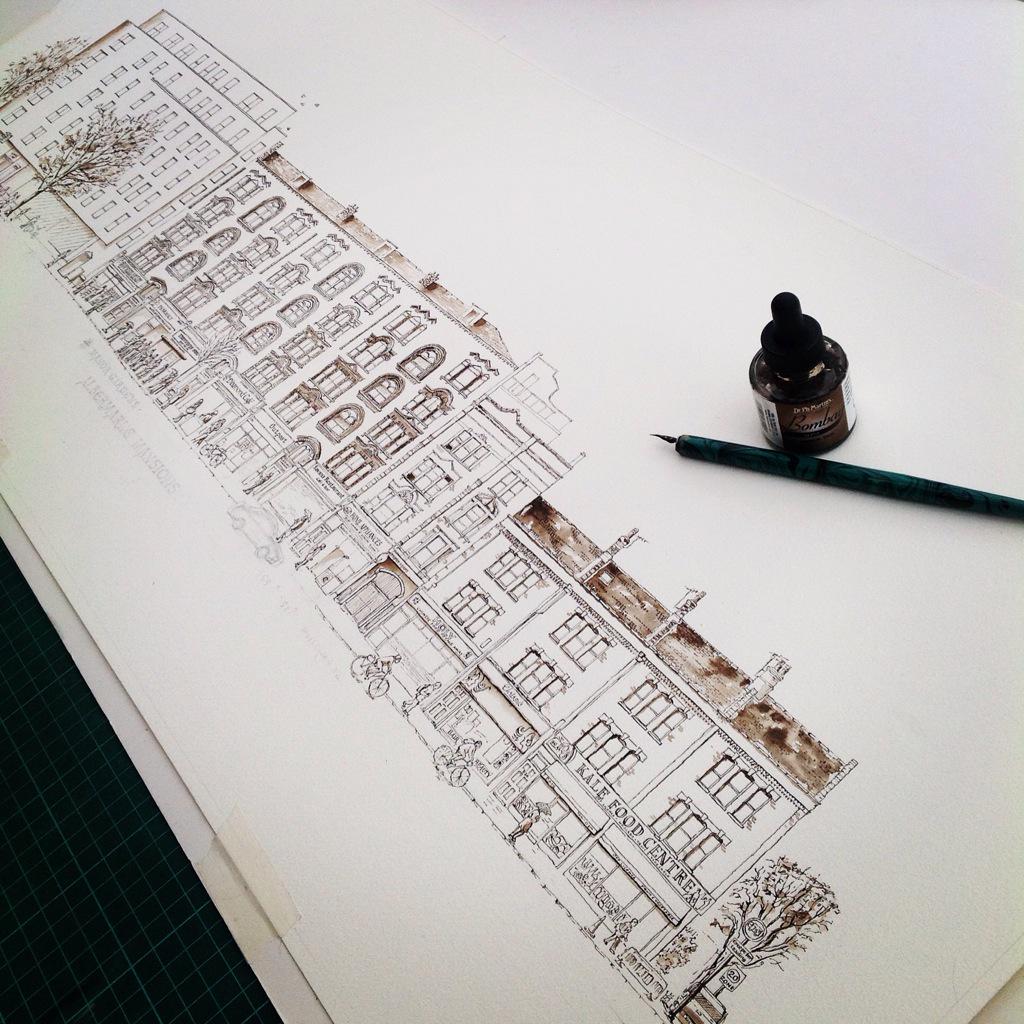 |
| By @ronniecruwys of drawingthestreet.co.uk |
This is the last of the Albermarle Mansions stories and it might be the best. Here goes:
'
Stated by the police to be considered in Ireland a very daring and dangerous criminal, George Green (34) whose address was given as Albemarle Mansions, Holloway, was convicted with Herman Rowland Panzer* (39), of the same address, of the theft of a duplicating machine from an office at Isleworth, at Brentford today.
The police said that Green had been convicted for causing assemblies, for being responsible for outrages, for escaping from Cork prison, and for shooting at an inspector for which he had had 20 strokes of the cat.
In this country he had been convicted for robbing a bank and for being concerned in the stealing of firearms and 10,275 rounds of ammunition. He was, added the police, a very daring gunman who did not hesitate to shoot to avoid arrest.
Green and Panzer were sentenced to six months' imprisonment on the present charge.'
 |
| By @ronniecruwys of drawingthestreet.co.uk |
This piece appeared word for word in the 3 April 1929 editions of the Derby Daily Telegraph, the Gloucestershire Echo, Hull Daily Mail, the Hartlepool Mail, and the Nottingham Evening Post. On 4 April the Western Daily Press picked it up. None of the London papers covered it. There are no follow-up pieces. Here goes:
'Duplicating machines' are early photocopiers. They're not the kind of thing you'd steal if you were just a thief because they're heavy and anyway, what would you do with one? That's the first hint that we're not dealing with a standard criminal, but with someone who might have wanted to distribute pamphlets or leaflets.
'Causing assemblies' could refer to trade union activity, or to any other form of activism. The link to Ireland means that I.R.A. is the most likely answer.
In 1923 dozens of I.R.A. veterans had escaped from Cork city gaol with the men who facing death going first and the rest waiting their turn according to the length of their sentence. It's one hell of a story (see
here).** I can't find any mention of a George Green that fits the bill in the
online prison archives, but if this were a proper research project rather than what it is I'd wouldn't have given up there.
The Cork prison escape story seems to have been reported only in a short piece in the Western Daily Press.*** Perhaps Irish news didn't sell. Perhaps the Government of the day wasn't keen on the story being covered (but would they have had that much influence on the press? Perhaps the prison authorities in Ireland managed to keep the story quiet?
* A 'Herman Roland [not Rowland] Panzer' was living in 7 Parkhurst Road, Islington 1911 as a 'disengaged' clerk. This thread suggests strongly that he also went by the name of Armyn Roland Panser and married bigamously under both names.
**You can go on a team-building 'Jail Break' adventure at the gaol building. The people who came up with that idea are now working on 'Potato famine: the cook book'.
*** That's all that turns up if you search for 'Cork City Gaol' and 1923 in britishnewspaperarchive.co.uk

![Bessie Butt (fl. early 20th century), English dancer, actress and singer, as principal boy in Aladdin, pantomime, Theatre Royal, Glasgow, Christmas 1909 (photo: Langfier, Glasgow, 1909) ‘Born in London within the sound of Bow Bells [the traditional description of a Cockney], Miss Bessie Butt commenced her stage career at a very early age by playing the child part in [Minnie Palmer's popular vehicle] My Sweetheart. While still in her early ‘teens she toured through many European countries in company with her brothers - the Reed Family - and made quite a big reputation as a transformation dancer, being billed as “Baby Butt.” An unfortunate illness kept her from the stage for a long period, and her next appearance was under the management of Mr. John Tiller, who looked upon her as one of the most promising of his young recruits. ‘Having ambitions, Miss Butt decided on doing a single turn on the halls, and at once sprang into popularity wherever she appeared. The late Walter Summers saw her, and recommended her so highly to Mr Robert Arthur that she was engaged by him as second girl for the Kennington theatre pantomime of Red Riding Hood, and there she made her first great success in [singing] “Ma blushing Rosie.” The late Clement Scott [dramatist and theatre critic, 1841-1904] was so taken with this number that he went several times to hear it. Miss butt’s next appearance was [on tour] under the management of Mr. George Edwardes as Susan in The Toreador [originated by Violet Lloyd, Gaiety, London, 17 June 1901], and this was followed by Sophie in A Country Girl [originated by Ethel Irving, Daly’s, London, 18 January 1902] and Thisbe in The Orchid [originated by Gabrielle Ray, Gaiety, London, 26 October 1903]. After this she was for twelve months at the London Coliseum, where she created several parts, notably the Black Pearl in Mr. Leslie Stuart’s song specially written for Mr. Eugene Stratton, and produced at the Coliseum in 1905. She also appeared as a wonderfully life-like doll in Mr. Will Bishop’s [ballet] My Gollywog. This was in 1906. ‘A pantomime engagement as Cinderella at Cheltenham was followed by a return to the halls under the managements of Mr. Oswald Stoll, the late Mr. G.A. Payne, and others; and then Miss Butt was seen and secured by Mr. Lester Collingwood to play the title roole in his pantomime of Cinderella at the Alexandra, Birmingham, in 1907. The success was phenomenal, as the run of the pantomime was a record for the country. On that occasion also Miss Butt won the “Owl” cake and diamond ring in a local beauty competition. This year Miss Butt has discarded skirts and gone in for principal boy, and as Dandini at the Royal County Theatre, Kingston, she is undoubtedly the hit of a most successful [Cinderella] pantomime [; other members of the cast were Dorothy Grassdorf, Hilda Vining and Laurie Wylie]. During her short career she has introduced many popular songs, of which probably the most successful have been “Scarecrow,” “Amelia Snow,” “Cherries are blooming,” “Peggy, the pride of the Mill,” and “Sunshine Soo,” her latest effusion, which is likely to eclipse in popularity all the others. Gifted with youth, beauty, a sweetly clear and distinct voice, a genius for dancing, and unlimited vivacity, there is no knowing to what heights this clever lady may aspire.’ (The Era, London, Saturday, 30 January 1909, p.13c)
Bessie Butt (photo: White, Bradford, circa 1908)](http://41.media.tumblr.com/f6cde29a182790e5a94cf78ab827c912/tumblr_mlbxgqQLQM1rswg65o1_400.jpg)




